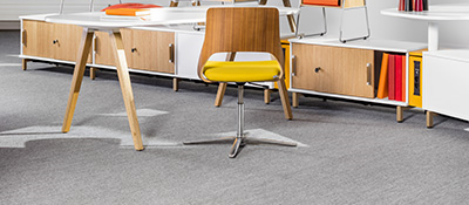July 25, 2016
Many UK workers don’t think current employee benefits meet their needs 0
 A new study published to coincide with Smarter Working Day (today, apparently) claims that almost half of UK workers (48 percent) don’t think their current employee benefits package is tailored to their needs. The study of 1,000 UK workers published by payroll lending provider SalaryFinance claims that 38 percent of UK workers currently have access to flexible working although only 26 percent say they prefer the chance of flexible working to financial and psychological wellbeing benefits. Fewer than one in five (19 percent) currently have access to benefits designed to support mental wellbeing, such as counselling services, and only one in four (26 percent) receive financial wellbeing support from their employer. In contrast, one in three (32 percent) receive ad hoc incentives such as free lunches, birthday cakes and duvet days. With 58 percent of people saying that their employer has never asked for feedback on their benefits programme, employers could be falling out of touch with the needs of staff, claims the research.
A new study published to coincide with Smarter Working Day (today, apparently) claims that almost half of UK workers (48 percent) don’t think their current employee benefits package is tailored to their needs. The study of 1,000 UK workers published by payroll lending provider SalaryFinance claims that 38 percent of UK workers currently have access to flexible working although only 26 percent say they prefer the chance of flexible working to financial and psychological wellbeing benefits. Fewer than one in five (19 percent) currently have access to benefits designed to support mental wellbeing, such as counselling services, and only one in four (26 percent) receive financial wellbeing support from their employer. In contrast, one in three (32 percent) receive ad hoc incentives such as free lunches, birthday cakes and duvet days. With 58 percent of people saying that their employer has never asked for feedback on their benefits programme, employers could be falling out of touch with the needs of staff, claims the research.









 Whether or not you raise an eyebrow every time you hear about the need for employee engagement, there is a growing body of research which links engagement to performance.
Whether or not you raise an eyebrow every time you hear about the need for employee engagement, there is a growing body of research which links engagement to performance. 
 A quarter (25 percent) of British workers would be willing to accept a lower salary in return for better ‘work perks’ a new survey claims. Employment bonuses, such as flexible working, a company car or free food have become increasingly popular over the last few years, which explains why 55 percent of UK workplaces already offer work perks, the survey suggests. Workers in Wales are most likely to accept a lower salary with almost a third saying they would accept a position for less money if it had better perks. The survey was commissioned by
A quarter (25 percent) of British workers would be willing to accept a lower salary in return for better ‘work perks’ a new survey claims. Employment bonuses, such as flexible working, a company car or free food have become increasingly popular over the last few years, which explains why 55 percent of UK workplaces already offer work perks, the survey suggests. Workers in Wales are most likely to accept a lower salary with almost a third saying they would accept a position for less money if it had better perks. The survey was commissioned by 
 Office politics is the one thing many young people are least prepared for when starting their first job, according to a new study by the Co-op. The study comes as many them are about to enter the workforce for the first time. With more young people opting for the world of work in the form of apprenticeships and on the job training rather than higher education, the members of ‘Generation Y’ often find they are unprepared for these softer skills needed to get on in the office according to the poll of 1,100 16-25 year olds. Over half of young people (54 percent) said that they were not prepared or informed about office politics. The study is part of the Co-op’s campaign to champion young people in the workplace by taking a closer look at what motivates 16-25 year olds. The research suggests that young people could find it harder to express opinion and ideas in the workplace, which in turn could lead them to feel isolated and unsupported.
Office politics is the one thing many young people are least prepared for when starting their first job, according to a new study by the Co-op. The study comes as many them are about to enter the workforce for the first time. With more young people opting for the world of work in the form of apprenticeships and on the job training rather than higher education, the members of ‘Generation Y’ often find they are unprepared for these softer skills needed to get on in the office according to the poll of 1,100 16-25 year olds. Over half of young people (54 percent) said that they were not prepared or informed about office politics. The study is part of the Co-op’s campaign to champion young people in the workplace by taking a closer look at what motivates 16-25 year olds. The research suggests that young people could find it harder to express opinion and ideas in the workplace, which in turn could lead them to feel isolated and unsupported.


 The ethics of everyday working life are the subject of two new surveys. A study from job site
The ethics of everyday working life are the subject of two new surveys. A study from job site 
 The patience of British workers to put up with slow and malfunctioning technology lasts just sixty seconds on average before they lose their temper, according to new research from tech firm
The patience of British workers to put up with slow and malfunctioning technology lasts just sixty seconds on average before they lose their temper, according to new research from tech firm 

 The overwhelming majority of UK employees (81 percent) are working beyond their contracted hours, claims a report from recruitment firm
The overwhelming majority of UK employees (81 percent) are working beyond their contracted hours, claims a report from recruitment firm 


 There is no doubt that the UK’s office based knowledge industry is facing a crisis in the form of a ‘wellbeing deficit’. Both the Confederation of British Industry (CBI) and Health and Safety Executive (HSE) have reported record levels of absenteeism, with the latter attributing 23.3 million lost working days to work-related ill-health, such as depression, stress, anxiety and musculoskeletal disorders. A great deal is already known about the causes of the key issues of employee stress and demotivation, but more work needs to be done to establish how organisations can meet their corporate goals with regard to these issues, whilst still engaging, motivating and nurturing their workforce. A significant body of published research has identified that a sense of ‘personal control’ can have a hugely positive impact on employee wellbeing, but how can we engender that control when it comes to creating a productive working environment?
There is no doubt that the UK’s office based knowledge industry is facing a crisis in the form of a ‘wellbeing deficit’. Both the Confederation of British Industry (CBI) and Health and Safety Executive (HSE) have reported record levels of absenteeism, with the latter attributing 23.3 million lost working days to work-related ill-health, such as depression, stress, anxiety and musculoskeletal disorders. A great deal is already known about the causes of the key issues of employee stress and demotivation, but more work needs to be done to establish how organisations can meet their corporate goals with regard to these issues, whilst still engaging, motivating and nurturing their workforce. A significant body of published research has identified that a sense of ‘personal control’ can have a hugely positive impact on employee wellbeing, but how can we engender that control when it comes to creating a productive working environment?








July 22, 2016
The people centric urge to personalise space helps firms to engage employees 0
by Paul Goodchild • Case studies, Comment, Wellbeing, Workplace design
(more…)